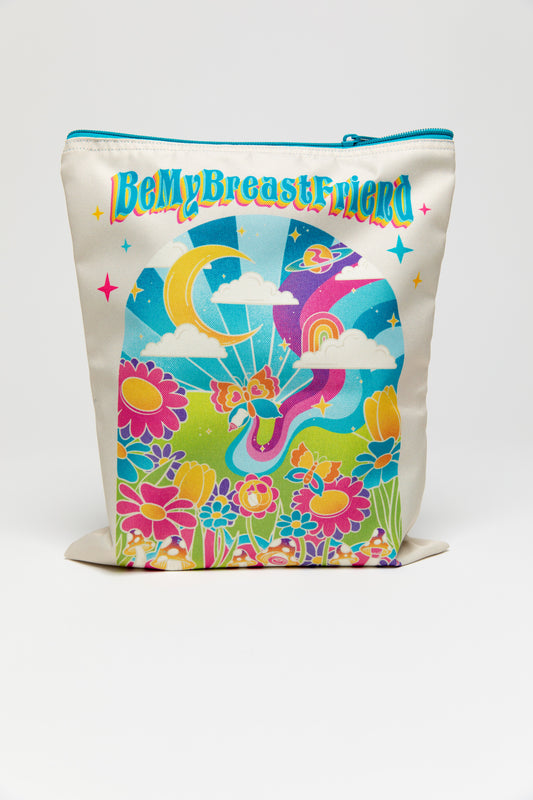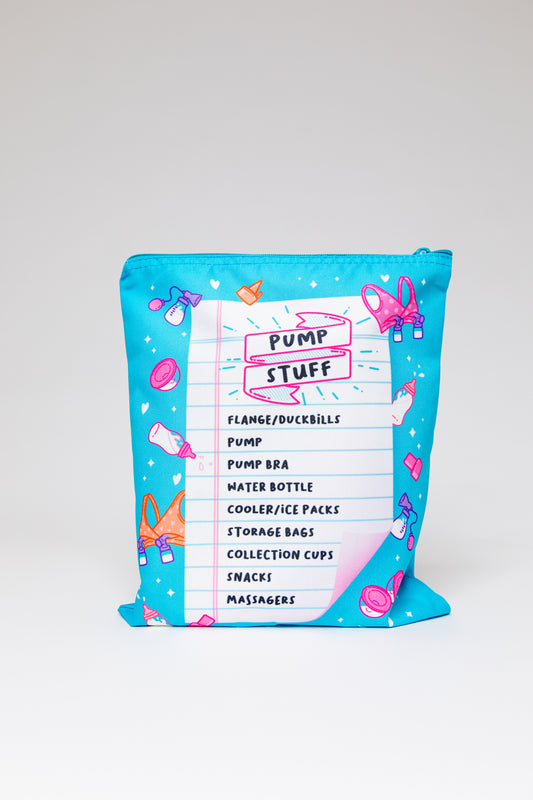Let's talk about caffeine!
As you probably already know, caffeine is a natural stimulant found in various plants, like tea and coffee. When it is consumed, it will speed up the messages being delivered between the brain and the body. This results in the consumer becoming more alert and temporarily warding off tiredness. It is also a substance that will stay in the body for a good bit of time, due to it having a half-life of 5 hours. Meaning, when you consume a drink with 60 mg of caffeine, there will be 30 mg of caffeine in your system 5 hours later. As a pregnant or exclusive breastfeeding mother, it's important to understand the effects of maternal caffeine consumption on your new baby.
While your mind may immediately jump to coffee, it is important to remember that caffeine comes in many different forms, such as soft drinks, energy drinks, green tea, dark chocolate, etc. Watching our intake and knowing what our daily caffeine consumption should ideally be, can be challenging when pregnant or lactating. There are so many opinions on the subject that it is hard to know what to listen to. As with most things, the guidelines for surrounding caffeinated drinks are a little different in pregnancy compared to breastfeeding. Let’s visit each phase individually to get a good idea of what your caffeine intake can look like, so you can make a confident, informed decision on your caffeine consumption!
Pregnancy + Caffeine
Caffeine consumption and pregnancy can easily become a tricky conversation. There does not have to be an all-or-nothing approach though. If you are a dedicated coffee drinker, know that you do not have to let go of your morning coffee for the next nine months of pregnancy. Some caffeine is totally fine. Specifically, let’s consider ACOG’s (American College of Obstetricians and Gynecologists) recommended caffeine consumption during pregnancy
Moderate amounts of caffeine consumed by pregnant women- aka. 𝗹𝗲𝘀𝘀 𝘁𝗵𝗮𝗻 𝟮𝟬𝟬 𝗺𝗴 𝗽𝗲𝗿 𝗱𝗮𝘆- is considered safe! This can equal about 1-2 cups of coffee or 2-4 cups of caffeinated tea. Research shows that less than 200 mg of caffeine per day does not appear to contribute to miscarriage or preterm labor.
So why is caffeine consumption a concern during pregnancy in the first place?
Caffeine crosses into the placenta, which means the baby will be stimulated by the caffeine as well. Obviously, too much of a stimulant could be harmful for your unborn child.
Additionally, it increases the mother’s catecholamine levels. Catecholamine is a specific neurohormone that is released into our body when we experience physical or emotional stress. An increase in our catecholamine levels can cause high blood pressure, which can then lead to things like headaches, sweating, pounding heart, and anxiety. There have been concerns about a potential relationship between caffeine exposure and the incidence of spontaneous miscarriage.
Now, don't start panicking...
It is important to know that the studies investigating the association between caffeine intake and miscarriage have been based on small sample size groups. Without getting to deep into the qualities of strong scientific research, it is good for us to know that a small sample size cannot be generalized to the larger population. The good news from these studies and findings though, is that regardless of the volume of caffeine intake, they did not find an association/ a relationship between caffeine intake and miscarriage. So, if you want that morning cup of coffee, you are free to do so!
Lactation + Caffeine
Now, let’s talk about caffeine when the new baby is here. Especially during those first few months as a new mom, sleep deprivation is very real, and you can be desperate to find some way to help combat exhaustion. Caffeinated beverages can help provide the boost of energy needed to make it through the day, but we want to make sure we are informed consumers.
For most breastfeeding mothers, the safe level of caffeine intake is around 300-500 mg of caffeine daily.
Current research has shown that new mothers have a lot less to be concerned about when it comes to caffeine intake and lactation. Let’s consider a P𝘂𝗯𝗠𝗲𝗱 study comparing the intake of 10 cups of coffee and maternal caffeine peak time with the response in infants more than 3 weeks old, as well as infants younger than 3 weeks. Here is a quick summary of the findings:
- The researchers found that caffeine appears in the mother’s milk approximately 1-2 hours after maternal ingestion.
- The moms who ingested 5 cups a day reported no stimulation in breastfed infants 3 weeks or older
- Babies who were exposed to 10 cups of coffee through breastmilk caffeine saturation showed fussiness, jitteriness, and poor sleep patterns. Therefore, you may find that a high caffeine intake may have a direct impact on your baby’s behavior and sleep.
- For new moms whose baby is less than 3 weeks old, it is also recommended that you reduce your caffeine intake because your baby’s metabolism is slower at that time.
With our better understanding of the relationships between caffeine and pregnancy and between caffeine and lactation, there is one additional piece of information for you to know.
Current research has shown that most pregnant women do not exceed the recommended maximum daily dose of caffeine. It was the breastfeeding women who were often consuming more than the recommended amount of caffeine. (I think many of us could have come to this conclusion without needing a study to confirm.) Postpartum can be challenging and having a solid support system to rely on (more than just your morning cup o' joe) is important to have.
Click here to read the PubMed study if you are curious and would like to learn more!
Informed + Caffeinated
For those of you who wish to enjoy a caffeinated drink or snack, simply keep an eye on your caffeine intake. Remember: moderation is your best friend! If you are pregnant, caffeine crosses into the placenta. If you’re a lactating mom, the caffeine will make its way into your breastmilk 1-2 hours after you have consumed it. Whether you are currently pregnant or postpartum, remaining aware of what you are consuming is always beneficial to both you and your little one.
Below is an easy reference of commonly consumed caffeinated favorites for you.
|
Item |
Caffeine Content |
|
Dunkin’ Donuts Medium Coffee |
210 mg |
|
Starbucks Grande Pikes Place |
310 mg |
|
Starbucks Grande Iced Blonde Vanilla Latte |
170 mg |
|
12 oz Red Bull |
111 mg |
|
12 oz Celsius Energy Drink |
200 mg |
|
12 oz Pepsi |
38 mg |
|
12 oz Poppi Doc Pop or Classic Cola |
32 mg |
|
8 oz Green Tea |
30-50 mg |
|
8 oz Black Tea |
42 mg |
|
1 oz Dark Chocolate |
12 mg |
|
Herbal Tea (Peppermint, Red Raspberry Leaf, Ginger) |
0 mg |
Looking for a fun way to drink your favorite caffeinated beverage?
Grab your own Tired Moms Club mug! Whether you're grabbing coffee in the morning or enjoying a mocktail or cocktail at night, this mug has you covered.
Features include:
- 12 ounce, push on seal sip lid.
- Premium grade stainless steel.
- Hot or cold, your choice!
- Free shipping.
- $1 donated to Ronald McDonald for each item sold.







